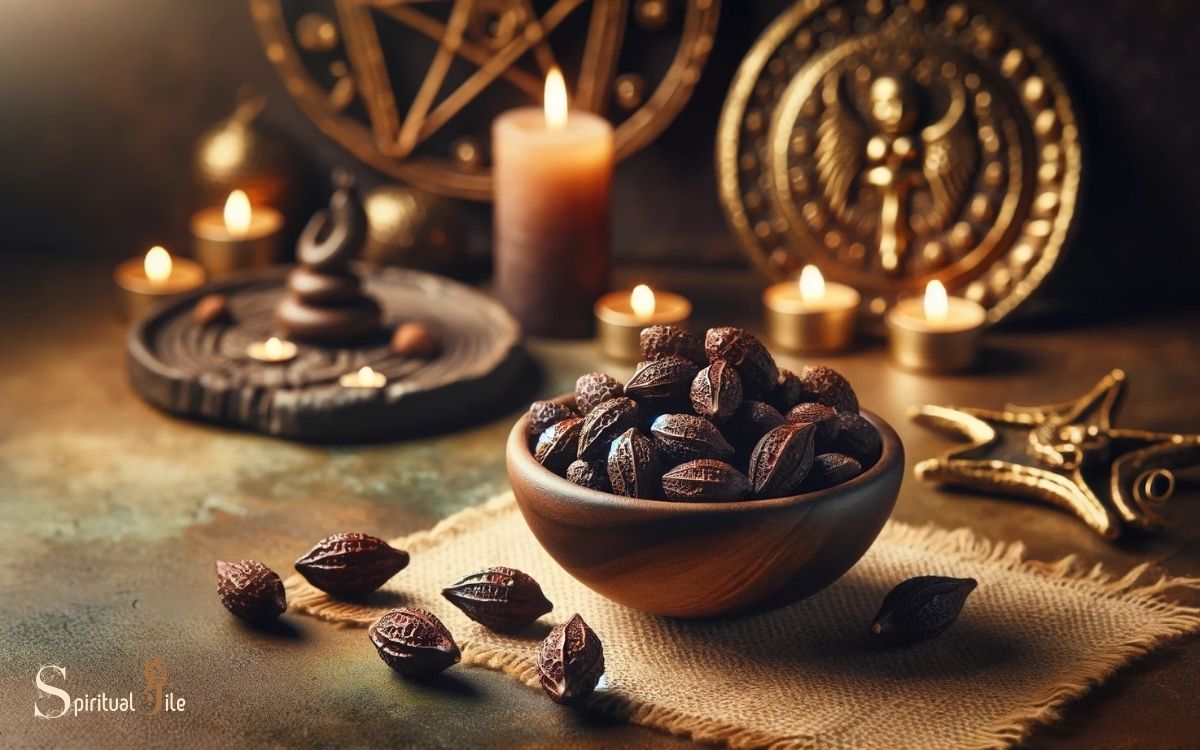Spiritual Use of Bitter Kola: Garcinia!
Bitter kola, also known as Garcinia kola, is a plant native to West Africa that is revered for its medicinal properties. Traditionally, it is used to fight infections, reduce inflammation, and improve respiratory conditions.
In the spiritual context, bitter kola is believed to have protective and healing properties. It is often used in various rituals and ceremonies, and many people carry it as a talisman to ward off evil spirits or to bring good luck.
Bitter kola holds a significant place in African traditional medicine and spirituality. The nut is thought to contain divine energy that can help in spiritual cleansing and protection.
Here are some specific spiritual uses:
The spiritual aspects of bitter kola are deeply woven into the fabric of many African cultures, and its use is often accompanied by specific prayers or incantations.
Embracing the mystical aspects of nature, bitter kola serves as a cultural bridge between the physical and the spiritual, offering not only health benefits but also serving as a conduit for spiritual well-being.

Key Takeaway
History and Cultural Significance
In my research, I’ve found that the history and cultural significance of bitter kola can be traced back several centuries in various West African societies.
Bitter kola, scientifically known as Garcinia kola, holds a revered position in traditional ceremonies and healing practices of the Yoruba, Igbo, and other ethnic groups in Nigeria.
It is often used in rituals to communicate with ancestral spirits and deities, symbolizing purity and spirituality. The bitter kola nut is also exchanged as a gesture of goodwill and hospitality during traditional gatherings and ceremonies.
Its cultural significance extends beyond Nigeria, being used in various spiritual and healing rituals across West Africa.
Understanding its historical and cultural importance provides valuable insights into the spiritual and social fabric of these societies, enriching our appreciation of their traditions.
Symbolism and Spiritual Beliefs
When it comes to the spiritual use of bitter kola, its symbolism and significance in rituals hold a profound meaning in many cultures. This small but powerful nut plays a crucial role in various spiritual practices and beliefs, representing different aspects of life and the divine.
Exploring the spiritual beliefs surrounding bitter kola provides a deeper understanding of its cultural importance and the reverence it holds in traditional ceremonies.
Bitter Kola in Rituals
Bitter Kola holds significant symbolism and spiritual beliefs in rituals, particularly in West African traditional practices. In these rituals, Bitter Kola is often seen as a symbol of hospitality, friendship, and respect.
It is commonly used to welcome guests and to honor spiritual beings. The act of breaking and sharing Bitter Kola is a gesture of goodwill and unity, promoting a sense of community and togetherness.
Moreover, Bitter Kola is believed to possess spiritual cleansing properties, and it is often included in rituals to ward off negative energy and evil spirits.
Its bitter taste is thought to represent the challenges and hardships in life, and by incorporating it into rituals, individuals seek strength and resilience to overcome adversity.
In essence, Bitter Kola plays a central role in fostering spiritual harmony and protection within traditional West African rituals.
Spiritual Significance of Kola
Having explored the role of Bitter Kola in rituals, I find it essential to delve into the spiritual significance of Kola in terms of its symbolism and spiritual beliefs.
In many African cultures, Kola nuts hold deep spiritual significance and are often used in traditional ceremonies and rituals.
Here are some key spiritual beliefs and symbolism associated with Kola nuts:
- Symbol of Hospitality: Kola nuts are often presented as a sign of hospitality and friendship in many African societies.
- Connection with Ancestors: The act of breaking and sharing Kola nuts is believed to establish a connection with ancestors and spiritual beings.
- Symbol of Unity: Kola nuts are used to symbolize unity and togetherness, often being shared during important gatherings and ceremonies.
These beliefs and symbolism illustrate the profound spiritual significance that Kola nuts hold in various African traditions.
Traditional Ceremonial Practices
I’m excited to explore the traditional ceremonial practices involving bitter kola. These practices often incorporate bitter kola in rituals, highlighting its cultural significance and spiritual importance.
Understanding the role of bitter kola in these ceremonies sheds light on the deep-rooted traditions and beliefs surrounding this revered plant.
Bitter Kola in Rituals
In my culture, the use of bitter kola in rituals is deeply ingrained in our traditional ceremonial practices. Bitter kola holds significant spiritual value and is a key element in various rituals and ceremonies.
- Symbolism: Bitter kola is often used to symbolize purity, spirituality, and the presence of ancestors during rituals.
- Offerings: It is presented as an offering to deities and spirits to seek their favor, protection, and blessings.
- Cleansing: Bitter kola is utilized in purification rituals to cleanse individuals and spaces of negative energies and influences.
These rituals create a profound connection to our spiritual beliefs and heritage, fostering a sense of unity and reverence within our community.
Understanding the cultural significance of kola allows for a deeper appreciation of its role in our traditional practices.
Cultural Significance of Kola
During traditional ceremonial practices, bitter kola holds a prominent role as a symbol of purity and spirituality, representing a connection to our ancestors and serving as offerings to seek their favor and protection.
Cultural Significance of Bitter Kola
- Symbol of Purity and Spirituality
- Connection to Ancestors
- Offering for Favor and Protection
Bitter kola is deeply woven into the cultural fabric of many African societies, where it is used in various traditional ceremonies such as weddings, funerals, and naming ceremonies.
It is often presented to guests as a gesture of hospitality and respect. The cultural significance of bitter kola extends beyond its medicinal and spiritual properties, embodying communal values and traditions that have been passed down through generations.
This enduring cultural significance highlights the integral role that bitter kola plays in traditional ceremonial practices, fostering a sense of unity and reverence for ancestral traditions.
Healing and Purification Rituals
One essential aspect of healing and purification rituals involves incorporating bitter kola as a key component.
Bitter kola is believed to possess spiritual properties that aid in the cleansing of the body and mind, as well as the environment. In these rituals, the bitter kola nut is used in various ways to bring about healing and purification.
- Bitter kola is often consumed as part of a cleansing ritual to purify the body and rid it of negative energies.
- The nut may be used in spiritual baths or washes to cleanse the individual of impurities and promote overall well-being.
- Burning bitter kola as incense is believed to purify the environment and create a sacred space for healing rituals and spiritual practices.
Offerings and Sacred Uses
As I delve into the sacred uses of bitter kola, it is important to recognize its significance in healing and purification rituals.
In many spiritual traditions, bitter kola is offered as a symbol of respect and gratitude to the divine. It is believed that the bitter kola possesses potent spiritual energy, making it a valuable offering in ceremonies and rituals.
The act of presenting bitter kola is a way to seek blessings, protection, and guidance from the spiritual realm. Additionally, bitter kola is often used in sacred rituals to cleanse and purify the environment, as its bitter taste is associated with the removal of negative energy.
The sacred uses of bitter kola in offerings and rituals reflect the deep-rooted spiritual connection that many cultures have with this remarkable plant.
Bitter Kola in Divination
Exploring the spiritual significance of bitter kola, I find divination to be a practice where its use holds great importance.
In many African cultures, bitter kola is an essential tool for divination, playing a central role in the process of seeking guidance and insight from the spiritual realm.
- Symbolism: Bitter kola is often seen as a symbolic link between the diviner and the spiritual entities being invoked during the divination process.
- Purification: It is used to purify the space where the divination will take place, ensuring that the communication with the spiritual world is clear and undisturbed.
- Connection: Bitter kola is believed to enhance the diviner’s connection to the ancestors, spirits, or deities, facilitating the transmission of messages and guidance.
Understanding the cultural and spiritual significance of bitter kola in divination adds depth to the practice and its role in traditional belief systems.
Modern Relevance and Adaptation
Though rooted in tradition, my personal experience has revealed the modern relevance and adaptation of bitter kola in spiritual practices.
In today’s world, bitter kola is still used in various spiritual ceremonies and rituals, especially in African traditional religions and cultural practices.
Its significance has expanded to include not only traditional spiritual uses but also modern adaptations in spiritual healing and wellness practices. Many individuals incorporate bitter kola into their spiritual routines for its perceived cleansing and protective properties.
Additionally, bitter kola has found its way into contemporary spiritual practices, such as meditation and energy work, as a means of enhancing focus and promoting spiritual clarity.
This evolution demonstrates the enduring relevance of bitter kola in spiritual contexts, showcasing its ability to adapt to modern spiritual needs while maintaining its traditional significance.
Conclusion
The spiritual use of bitter kola holds a rich and revered place in traditional practices. Its history, symbolism, and ceremonial significance add depth and dimension to cultural beliefs.
From healing rituals to divination, bitter kola continues to play a vital role in spiritual practices. Its modern relevance and adaptation demonstrate the enduring power of this sacred symbol.






